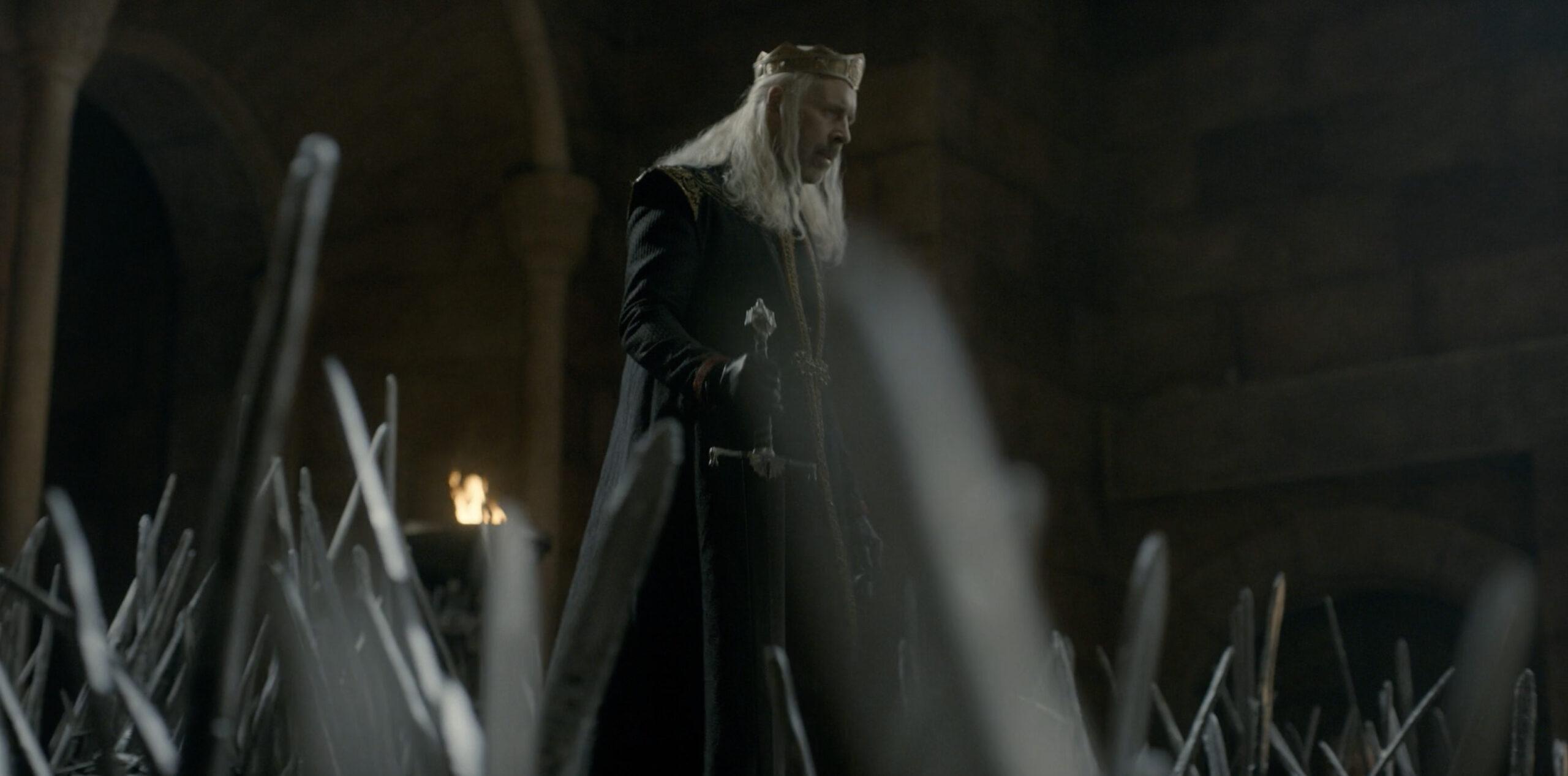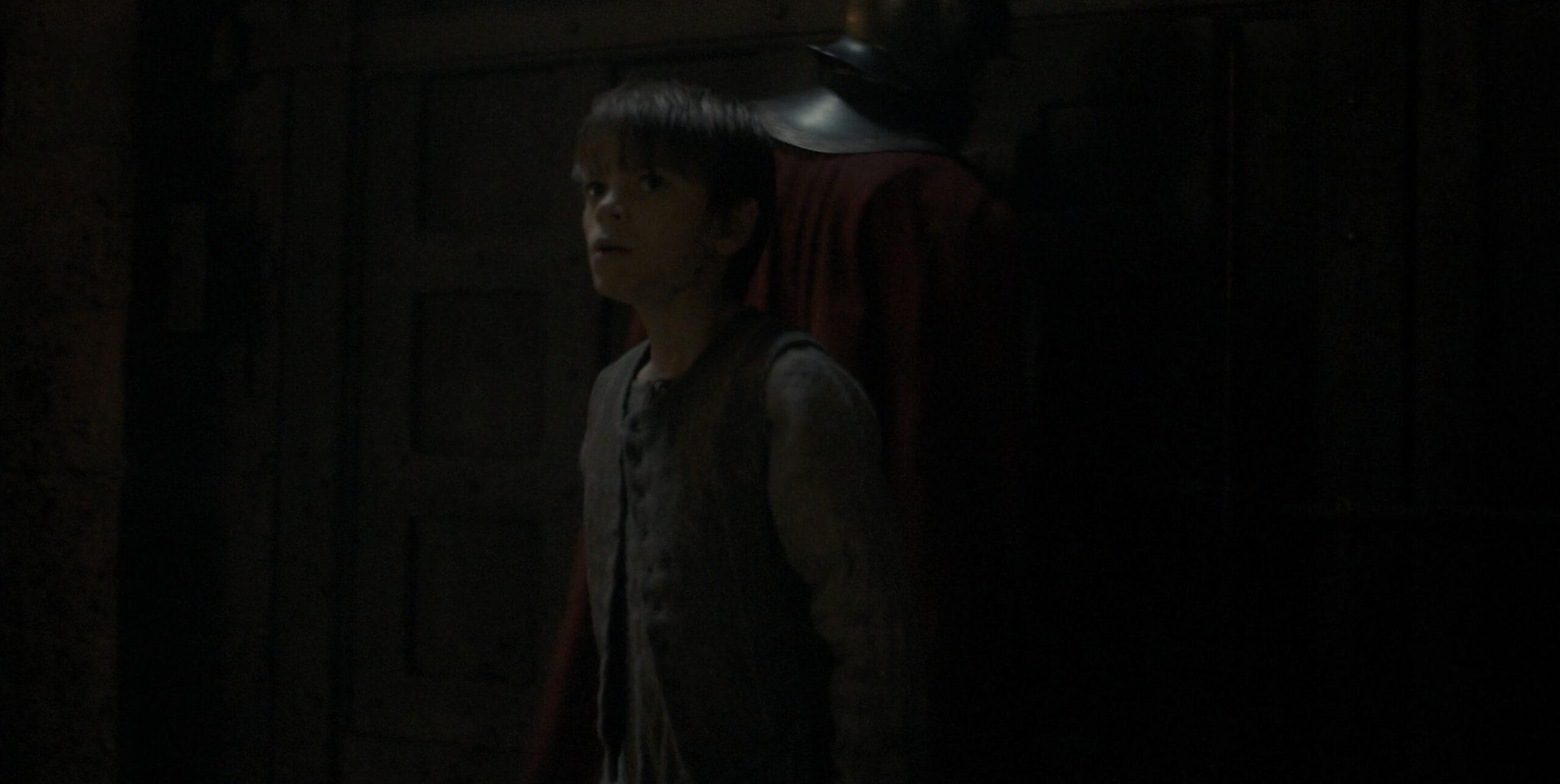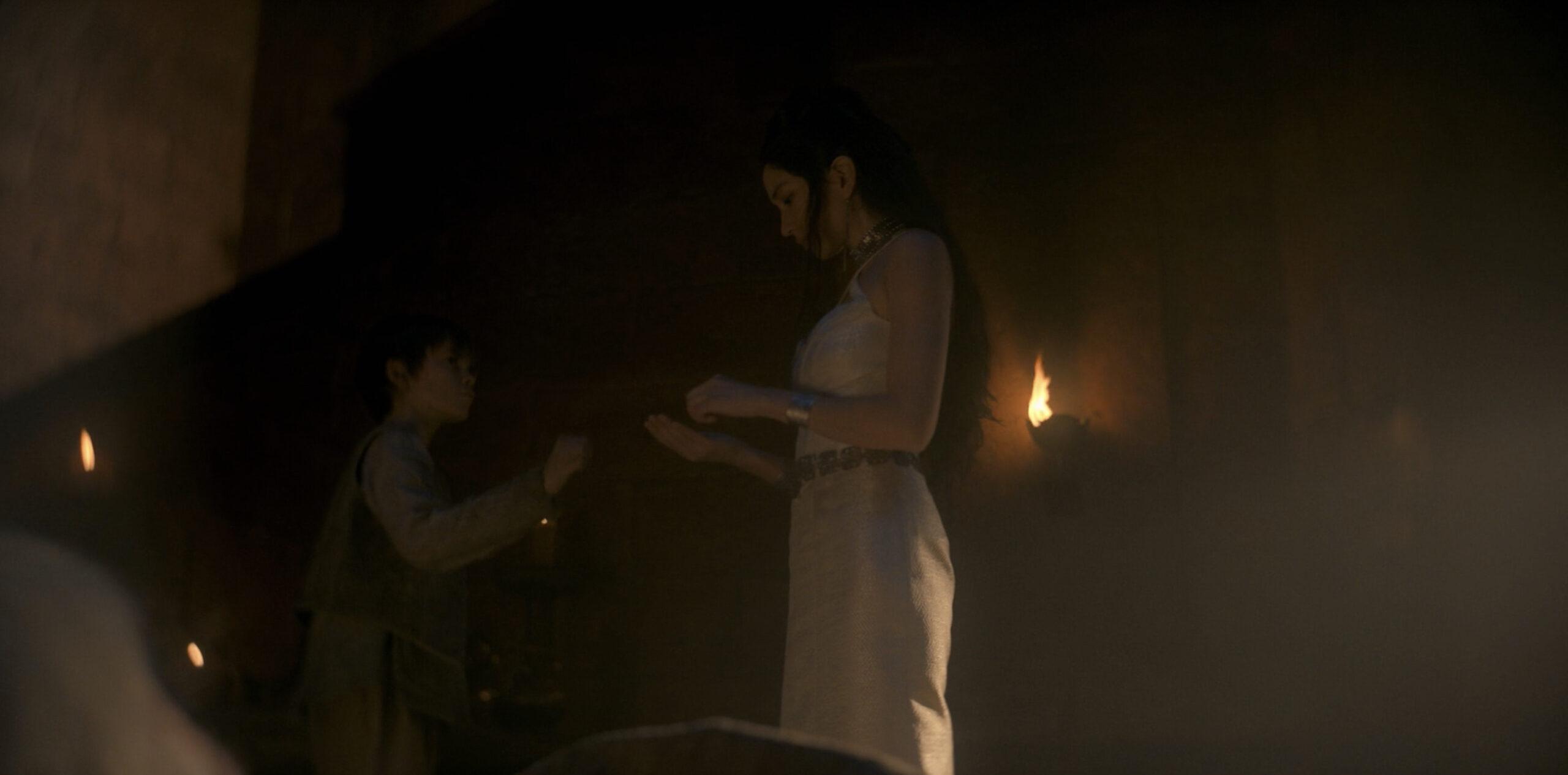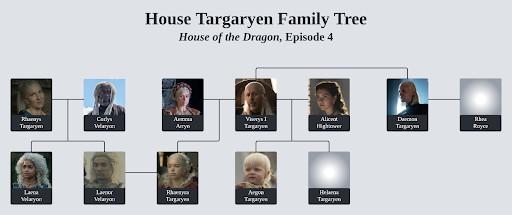We didn’t get very much dragon action in this episode of House of the Dragon, but that doesn’t mean the customs of House Targaryen weren’t on full display. The tension is rising in King’s Landing. Let’s examine one of the most complicated and important relationships in the show—that of the king and his brother.
Deep Dive of the Week: The Royal Brothers
The chaotic relationship between Viserys and Daemon went through the spin cycle this week, beginning with the two reconciling and ending with the king putting his dagger to his brother’s throat and exiling him from King’s Landing, seemingly for good. Will the two be at odds permanently? Or will they reconcile yet again at some point down the line?
To explore those questions, it’s necessary to examine the history between Viserys and Daemon.
In this episode, after Daemon bends the knee to Viserys and gives up his crown, the two briefly reminisce about their mother while in the gardens. Viserys says, “I will not revisit this debate—you were always mother’s favorite. … Our mother, she had no regard for custom or tradition, rules. And I, sadly, was no great warrior.”
When Alicent suggests that Daemon take a tour of the gallery and admire the Red Keep’s new tapestry, Viserys turns to his brother and laughs. “He’d have no interest in such things!” the King declares.
This brief scene provides some insight into Viserys and Daemon’s relationship with each other—and with their mother. In Fire & Blood, Alyssa Targaryen is described as a bit of a tomboy. “She wore boy’s clothes when she could, shunned the company of other girls, preferred riding and climbing and dueling with wooden swords to sewing and reading and singing, and refused to eat porridge,” the text reads.
Given what we know about Viserys and Daemon, it’s easy to see why their mother connected more with the latter during the limited time she had with her sons. Alyssa died young, after a difficult childbirth. Canonically, Viserys was 7 and Daemon 3 when their mother died—but it seems like the show is playing with that timeline and making the two a bit older when she passed away.
Their father also died before his time. As Viserys detailed last week, Prince Baelon died of a burst belly when Viserys was 24 and his brother 21. That death is what caused Jaehaerys’s succession crisis and prompted the Great Council of 101 AC, when Viserys was named heir to the throne.
These deaths help explain why Viserys and Daemon can at times be so closely bonded, despite their glaring differences. Daemon even served as Viserys’s master of laws and master of coin early in the king’s reign, before finally taking over the City Watch. When Otto suggests sending Daemon away in the premiere, Viserys forcefully defends his brother.
But fast-forward to the end of Sunday’s episode, and Viserys, who’s interrogating his brother about what happened the preceding night, is literally at Daemon’s throat over the accusations regarding him and Rhaenyra.
Daemon doesn’t try to explain himself, even though Viserys seems to be under the impression that Daemon and Rhaenyra had sex. (Otto’s hesitancy to tell Viserys exactly what Daemon and Rhaenyra did seems carefully designed to leave the king with this impression.) Daemon actually plays right into it, saying, “Better her first experience be with me than some whore.” It may simply be that his ego is too big to allow himself to clarify what happened, or that he already knows what his reputation is and doesn’t see a point in doing anything other than embracing it.
Seeing how Daemon deals with this accusation brings to mind a scene in Episode 1, when Otto delivers a different report about Daemon’s transgressions. In that scene, Otto tells Viserys about how Daemon rented out a pleasure house on the Street of Silk and toasted the king’s dead son, Baelor, styling him “the heir for a day.” “The evening was, by all accounts, a celebration,” says Otto.
But watch that scene more closely, and it’s not clear that Otto’s report is entirely faithful to the truth. Daemon rented out a pleasure house—of that there’s no dispute—but when we initially see him there, he isn’t celebrating. He’s sitting off to the side by himself, lost in a cup of wine, as ominous music plays. He’s certainly not celebrating. It’s not until his paramour Mysaria arrives that the mood changes, as she smiles and grabs him by the arm. “The king’s sole heir once again,” she exclaims. Daemon smiles in response, but he doesn’t seem genuinely happy. It’s then that Mysaria begins a toast. “Might we drink to our future?”
Daemon indulges the crowd, saying, “King and council have long rued my position as next in line for the throne. But dream and pray as they all might, it seems I’m not too easily replaced. The gods give, just as the gods take away. To the king’s son …” But then we don’t actually see Daemon say “the heir for a day.” Was it truly a celebration? And even if it was, was Daemon celebrating, or just those around him?
When Viserys confronts Daemon, the prince doesn’t deny Otto’s report, and his explanation that “we must all mourn in our own way” comes off as pitiful. But might there be some truth to it?
I see similar ambiguity in another scene from Episode 1. When Otto and Grand Maester Mellos float the idea that Daemon is a danger as heir to the throne—and hint that he may even kill Viserys to take the crown—Daemon is seen off in the shadows, eavesdropping. He smirks when Viserys suggests that his brother lacks the patience for the throne. That scene seemed to imply that Daemon does want to be king … but Daemon’s reaction could just as easily mean he knows that Viserys is the only person in the room who understands him.
There’s also a scene in Episode 2 that reveals Daemon’s feelings toward his brother. When Corlys complains about Viserys’s inaction against the Triarchy, Daemon shuts him down. “I will speak of my brother as I wish,” Daemon says. “You will not.”
Viserys and Daemon love each other, but they don’t respect each other. To Daemon, Viserys is weak and pathetic. To Viserys, Daemon is hot-headed and chaotic. And at this point, Viserys does seem convinced that Daemon is after the throne—or at the very least is trying to destroy him. But as Daemon says in Episode 1, the blood of the dragon runs thick.
Quick Hits
Who becomes hand of the king now?
Otto is out. But who is in? Let’s run through some potential candidates to be the next hand of the king.
Viserys may realize that Daemon was right about Otto scheming for himself, and in Episode 1, Daemon told his brother that he was upset that Viserys had never asked him to be his hand. But that bird has flown the coop, what with Daemon’s exile and all. Besides, it’s hard to imagine Daemon—who has already washed out as master of coin and master of laws—actually wanting the job. It’s more of a Gob situation.
Next up is Lord Lyonel Strong, the current master of laws. It’s unclear exactly how long Lyonel has been at court, but it’s been at least a few years. Last week, Lyonel counseled Viserys to marry Rhaenyra to Laenor Velaryon. That was truly the most sensible match for Rhaenyra, and she’s now set to marry Laenor as of the end of the episode. Plus, in suggesting Laenor, Lyonel deftly sidestepped the idea that he’d put forward his own son, Harwin—a stark contrast to Otto, who nominated his grandson Aegon out of clear self-interest.
However, Lyonel isn’t a perfect fit. When Rhaenyra was first floated as a potential successor to Viserys—by Otto, of all people—in Episode 1, Lyonel spoke out forcefully against the idea. “If order and stability so concerns this council then perhaps we shouldn’t break 100 years of it by naming a girl heir,” he said. Plus, in Fire & Blood, following the rumors about Daemon and Rhaenyra, Lyonel counsels Viserys to execute his brother. That advice evinces a complete misunderstanding of Viserys and Daemon’s relationship. What’s more, it would make Viserys a kinslayer, and many in Westeros would view him as cursed as a result.
Corlys Velaryon could make a good hand, but his relationship with Viserys appears too strained at this point. And besides, he’s proved to be too ambitious—it’d be hard for Viserys to trust that Corlys’s advice isn’t clouded by self-interest.
Ser Harrold Westerling, the current lord commander of the Kingsguard, could make a decent candidate. As a member of the Kingsguard, he cannot inherit lands or titles nor father children—so there’s no risk that he’ll scheme a way to put his house on the Iron Throne. And there is precedent for a single person simultaneously filling the roles of lord commander and hand of the king—Ryam Redwyne (the previous lord commander, who appeared in Episode 1) did it for a couple of years under King Jaehaerys. But while Ryam is considered one of the finest knights in Westerosi history, he was an utter failure as a hand. The skill sets for the two jobs couldn’t be more different, and there’s nothing to indicate that Harrold has the cunning or statesmanship that being hand demands.
Tyland Lannister is Viserys’s current master of ships following the departure of Corlys, and he also has a twin brother in Jason (the one who came on to Rhaenyra last week). The Lannisters are a powerful, wealthy house … but that’s practically a reason not to pick one to be hand. Jason has already earned Viserys’s ire for his naked self-interest. Plus, the Lannister twins are relatively recent arrivals in King’s Landing, and Viserys would be wise to seek more experience for the position of hand.
Lyman Beesbury is the current master of coin. He served in that role for many years under Jaehaerys, giving him plenty of experience in King’s Landing. But outside of Viserys briefly mentioning him in the premiere, he’s barely appeared on screen.
Finally, what about Rhaenyra herself? The princess was seen this week in a Small Council meeting, not as a cupbearer but seemingly as a full participant. What better way for her to learn to rule than by doing it? Baelon, Viserys’s father, served as hand of the king while he was Jaehaerys’s heir, though as Viserys mentions on this episode, that lasted for only a few days.
But Baelon was 43 when Jaehaerys named him hand; Rhaenyra is 18. She’s had trouble making allies, and her recent decision-making has been suspect, to say the least. Viserys needs someone he can rely on in this position—not someone who needs training.
The moon tea dilemma
As a medieval-inspired fantasy world, Westeros offers few options for contraception. We know there is some practice of abortion, and apparently there are even condoms, as one stray shot of Season 4 of Game of Thrones revealed. There is also the Cersei method of avoiding pregnancy, which just involves sexual acts that won’t result in children. As she tells Ned in A Game of Thrones:
She lifted her head, defiant. “Your Robert got me with child once,” she said, her voice thick with contempt. “My brother found a woman to cleanse me. He never knew. If truth be told, I can scarcely bear for him to touch me, and I have not let him inside me for years. I know other ways to pleasure him, when he leaves his whores long enough to stagger up to my bedchamber. Whatever we do, the king is usually so drunk that he’s forgotten it all by the next morning.”
But by far the most common form of contraception is moon tea, which is surely what Mellos brings to Rhaenyra at the end of this episode. Moon tea is made with a mix of herbs and honey, and it appears to be used only as a contraceptive. (Martin based the tea on real abortifacients that can be dangerous to consume.) Again Cersei provides some information when, in A Feast for Crows, she thinks to herself, “Women only drank moon tea for one reason; maidens had no need for it at all.”
This presents a bit of a problem for Rhaenyra. If she drinks the tea, she is essentially confirming she is not a maiden—and that piece of gossip could quickly spread.
Almost this exact scenario plays out in the Song of Ice and Fire novels. In A Feast for Crows, Grand Maester Pycelle reveals to Cersei that Margaery, who is married to Tommen, regularly asks him to brew moon tea for her. Tommen is only 8 at this point in the story, so that indicates that Margaery is having sex outside of her marriage. “My son has been betrayed,” Cersei declares to a few close advisers. “Margaery has a lover. That is high treason, punishable by death.” While Cersei cannot identify Margaery’s lover, this doesn’t stop her. She later lines up some men to falsely accuse Margaery of adultery, and has the young queen imprisoned.
Rhaenyra has placed herself in similar danger. How quickly word of her night with Daemon spread shows how closely she is being watched in King’s Landing, and there are plenty of people who would benefit from undermining her.
It’s important to note that Rhaenyra’s greatest adversary is Otto, and his house rules over Oldtown, which is the site of the Citadel, where maesters are trained. This gets a little conspiracy-minded, but there have been hints in the show that the maesters are close with Otto and House Hightower. When Aemma is struggling in childbirth in Episode 1, a maester first brings the news to Otto, who then informs the king. And when Otto later suggests that Daemon is a dangerous person to have in the line of succession, Grand Maester Mellos instantly supports him at the Small Council. Mellos also sends Otto’s letters for him, and confers with the hand about the king’s cuts and sores.
And if you really want to go deep on this conspiracy, it was the maesters who administered milk of the poppy to Aemma just before her death. Her son, the infant Prince Baelon, seemingly began choking to death while in Mellos’s arms. And after those deaths, Otto was able to smoothly position his daughter as the next queen.
That last part may be a bit of a stretch, especially since Baelon would have removed Daemon as the direct heir to the throne, which is what Otto wanted at that point in the story—it was far from a guarantee that Viserys would choose Alicent as his next wife. Plus, Aemma already had a long history of difficult pregnancies.
Regardless of whether there is a broader maester-Hightower conspiracy, Rhaenyra can’t discreetly drink the moon tea. She’ll either return a full cup or an empty one. And that will surely alert some in King’s Landing as to whether she’s truly still a maiden or not.
The interesting design of Blackfyre
This episode gave us a good view of an important piece of Targaryen hardware: Blackfyre.

Blackfyre is the Valyrian steel sword once wielded by Aegon the Conqueror, and is now in the possession of Viserys. With its monstrous blade, dragon-shaped cross guard, and black leather grip, this is a pretty accurate rendition of the sword as described in the books. Particularly catching my eye, though, is that seven-pointed star on the pommel. The seven-pointed star is a symbol of the Faith of the Seven—but Aegon the Conqueror brought Blackfyre with him to Westeros, and he didn’t convert to the Faith of the Seven until after he was crowned. That means the star is a later addition. So who added it?
Viserys is only the fifth king in the Targaryen dynasty, leaving few possibilities as to who could have added this detail. Aegon himself may have added the star as a show of solidarity with his new religion. But he wasn’t particularly pious and seemed to convert only for political purposes. It’s unlikely that Aenys, Aegon’s successor, added it. He is described as physically weak and gave the sword to his younger brother Maegor early in his reign. Maegor, meanwhile, certainly didn’t add the star. As king he warred with the Faith (as well as everyone else) during a bloody and chaotic reign that saw him earn the epithet “the Cruel.” That leaves Jaehaerys.
The Faith and the Targaryens did not get along early in the Targaryen dynasty, to say the least. The Targaryens were not only incestuous, but often polygamous as well. Neither was a practice the Faith could abide. While the Faith maintained an uneasy accord with Aegon the Conqueror, things erupted under Aenys, when then-prince Maegor, who was frustrated after 14 years of childless marriage, took a second wife. Aenys exiled his half brother as a result, but when Aenys married his son Aegon to his daughter Rhaena the next year, the Targaryens’ marriage practices could no longer be ignored. The High Septon at the time angrily declared that any children the young couple had would be “abominations in the sight of gods and men.” This began a bloody uprising by the Faith Militant (remember them?) that lasted through the reigns of Aenys and Maegor and into the reign of Jaehaerys.
When a 16-year-old Jaehaerys was king regent after the death of Maegor, one of his first orders of business was to marry his sister, Alysanne, despite knowing that this would not be well received by much of the realm. He did so in secret, on Dragonstone, with the help of an old septon he had known since childhood. When he returned to King’s Landing, his mother, Queen Alyssa, wept in terror. A different septon, Septon Mattheus, was more explicit: “They shall curse your incest from the Dornish Marches to the Wall, and every pious son of the Mother and the Father shall denounce you as the sinners you are,” he told the young king.
Jaehaerys was called the Conciliator because of his calm demeanor and propensity for compromise and negotiation, and he spent the first few years of his reign repairing the crown’s relationship with the faith. When he came of age and was coronated, he made sure it was done by a septon—Jaehaerys’s close friend Septon Barth, who later served as hand of the king. With Barth, Jaehaerys crafted the Doctrine of Exceptionalism, which included the idea that it was acceptable for Targaryens alone to engage in incest because, as silver-haired, purple-eyed, dragon-riding Valyrians, they were not like the other citizens of Westeros. The dragonlords of Old Valyria had always wed brother and sister, and so it was maintained that the dragonlords of Westeros would be permitted to do the same. The Starry Sept, itself weary of the war that had extended across decades, was content to accept this doctrine. Thus, the crown and the Faith were reconciled.
Surely this process took a bit more than a few friendly septons and one new doctrine. Changing the pommel of Blackfyre could have been part of Jaehaerys’s reconciliation efforts—a tangible symbol of Targaryen power making room for Westeros’s dominant religion.
To be clear, we don’t know that it was Jaehaerys who changed Blackfyre’s pommel (it’s never described this way in the books), but it sure would be consistent with his character. And it’s a detail that fits perfectly within Westerosi history, as well as within the broader themes of A Song of Ice and Fire. It’s a symbol that power—true influence over all the different factions and domains that make up a kingdom—can come from both ends of a sword, not just the pointy one.
Can Targayens take multiple spouses?
Speaking of the Doctrine of Exceptionalism and the Targaryens’ “queer” marriage customs, Daemon suggests in this episode that he marry Rhaenyra, despite his already having a wife in Rhea Royce (whom we still haven’t seen on screen). “I’ll wed her in the tradition of our house,” he says, referencing Aegon the Conqueror. This is, to put it mildly, a monumentally bad idea.
The Doctrine of Exceptionalism allows Targaryens to practice incest, but it does not permit polygamy. While Aegon the Conqueror had multiple wives, the only Targaryen to do so in the days after the Conquest was Maegor the Cruel. His second marriage prompted his brother Aenys, the king, to exile him—but Maegor didn’t stop there. After the death of his brother, Maegor returned to Westeros to claim the Iron Throne and wage war on the Faith Militant. Following a handful of victories over the Faith, Maegor took a third wife—a courtesan from Pentos named Tyanna who had nursed him back to health after he was grievously wounded. But none of Maegor’s wives gave him any children. Desperate for an heir, Maegor married three more women as hostages in a single ceremony, and they became known as his Black Brides.
Six wives, one king. And still, none of Maegor’s wives provided him an heir. A few gave birth to stillborn, malformed children—babies without eyes, one without legs or arms, etc. It became known throughout Westeros that Maegor was cursed.
Maegor’s reign soon ended, after his nephew Jaehaerys put forth his claim to the throne and much of Westeros rebelled against Maegor’s tyranny. But if the practice of polygamy had been unacceptable in Westeros before Maegor, it’s certainly out of the question now, given the violence and cruelty of his reign.
More recently, Jaehaerys’s daughter Saera, who always had a rebellious spirit, suggested that she could take multiple husbands, all of them men whom she’d already had sex with. Like Daemon, she compared herself to Aegon … and even to Maegor. Jaehaerys essentially imprisoned her just for the suggestion, and she later was sent to join the Faith of the Seven and train as a septa. She would go on to escape the septas and journey across the Narrow Sea to Lys, where she became a sex worker. Saera may still even be alive at this point (she’d be in her late 40s or 50s, depending on what year it is in the show), but Westeros has long since forgotten about her.
That is all to say, Daemon marrying Rhaenyra would be incredibly destructive to the realm, surely enraging the Faith of the Seven and the commonfolk of Westeros, not to mention making an enemy of House Royce, a powerful family in the Vale. And as Daemon tells Rhaenyra, marriage is a political arrangement … but a marriage between the two of them wouldn’t help them or House Targaryen. Daemon may have simply been trying to provoke his brother with this suggestion, because as a serious idea it just doesn’t make sense on any level.
Who is the White Worm?
The boy who tattled on Rhaenyra and Daemon didn’t go directly to Otto. Instead, the information came through someone called “the White Worm.” Who is that?
It happens quickly, but the boy who gives the report to Otto …

… can the next morning be seen giving money to Mysaria, who is dressed in white:

Mysaria tells Daemon that she’s left the life of a whore behind, and there is now one more schemer in King’s Landing than most of the characters may realize.
What was up with Rhaenyra’s suitors fighting?
In the premiere of House of the Dragon, Rhaenys comments that the knights at the tourney are “green as summer grass” and “none have known real war.” Their lords sent them to King’s Landing “with fists full of steel and balls full of seed,” she continues, as the tourney devolves into a bloody melee. “And they expect them to act with honor and grace. It’s a marvel that war didn’t break out at first blood.”
Something similar could be said about the courtship of Rhaenyra, which sees one young noble cut down another right in front of her. Let’s put aside the geopolitical questions about these acts of violence—are we really supposed to believe that the lords of Westeros would stand idly by as their heirs are cut down left and right for no reason?—and ask a different one: Just who were those two, and why did they hate each other so much?
As Boremund Baratheon tells Rhaenyra, the child who puts himself forward for her hand is a member of House Blackwood, “an ancient house with a formidable army. In the Riverlands, they once ruled as kings.” The man taunting him is a Bracken—and their feud goes back far further than this incident. In fact, the Blackwoods and the Brackens are a bit like the Hatfields and the McCoys of Westeros, with a rivalry that is legendary throughout the Seven Kingdoms.
House Bracken and House Blackwood’s feud goes back millennia—all the way to the Age of Heroes, when Westeros was ruled by hundreds of kings. Jaime learns all about it in A Dance With Dragons when he is in the Riverlands. These events happened so long ago that there can be no true history of all that transpired. The Blackwoods claim that the Brackens were petty lords who rose up against the Blackwood kings of old; the Brackens claim that they were kings first, and that the Blackwoods were traitorous lords who usurped them. The Blackwoods believe the Brackens poisoned an important weirwood tree … on and on it goes. Jaehaerys the Conciliator once forged a peace between the two houses, but it did not last.
When Aegon the Conqueror came to Westeros, both House Blackwood and House Bracken bent the knee and aided him in his conquest. But the houses had been at war with each other for a decade before his arrival, and as such the only support they could offer was relatively weak. As a result, after Aegon overthrew House Hoare, he installed House Tully as the lords of the region.
And so it is that House Bracken and House Blackwood continuously tear each other down. One of those houses could rule over the Riverlands right now if it weren’t for their centuries-long feud. Similarly, perhaps one would have Rhaenyra’s hand in marriage. House Blackwood won the battle in Episode 4, with the young Blackwood lord cutting down his Bracken foil, but both houses lose the war.
Family Tree Watch
Alicent was very pregnant in Episode 3, and by this episode she isn’t. But the show barely introduced the new royal infant, Princess Helaena. Meanwhile, Laenor and Rhaenyra are set to be married. Here’s where the House of the Dragon stands at the end of Episode 4:

Next Time On …
Here’s the preview for next week:
Dragon skipped over Viserys and Alicent’s wedding, but it won’t do the same with Rhaenyra and Laenor’s. And it appears that like any worthwhile Thrones wedding, this one won’t be without some violence.
